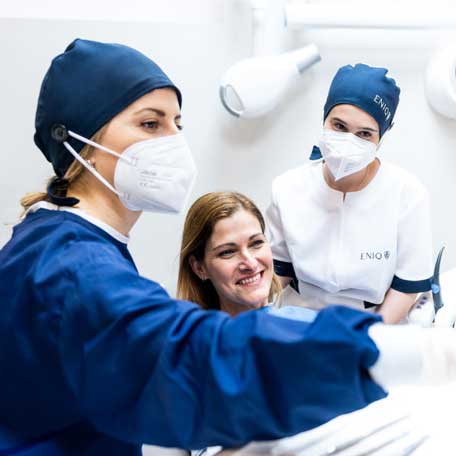

Pediatric Dentistry
We take care of your children's health with a loving and professional approach.
What is Bruxism?
Pediatric dentistry, also known as pedodontics, is a branch of dentistry that specializes in dental care for infants, children, and adolescents, including those with special health needs.
What are the common dental treatments for children in a dental clinic?
This specialty focuses on managing and treating children's dental health from birth through adolescence, characterized by the following features:
- Prevention and Education: A key focus is the prevention of cavities and other dental diseases, and education about proper oral hygiene from an early age.
- Specific Treatments for Children: Pediatric dentists perform dental treatments adapted to children, including cleanings, sealants, cavity treatment, and management of dental emergencies.
- Dental Development: They specialize in monitoring the growth and development of teeth and jaws, identifying and treating alignment or bite problems from an early age.
- Behavior Management: Pediatric dentists are trained to manage children's anxiety and behavior in the clinic, creating a welcoming and understanding environment.
- Specialized Equipment: They use tools and materials specifically designed for children, including smaller sizes and visual or themed elements to make the dental experience more child-friendly.
- Care for Patients with Special Needs: They are trained to treat children with a wide range of special health needs, adapting their techniques and approaches as necessary.
- Guidance for Parents: They provide advice and guidance to parents on topics such as nutrition, oral habits (like pacifier use or thumb sucking), and prevention of dental injuries.
- Transition to Adult Dentistry: They guide adolescents in their transition to more adult-focused dental care, including topics such as orthodontics and general oral health.
Pediatric dentistry plays a crucial role in establishing a solid foundation for good oral health throughout life. It is recommended that children start visiting the pediatric dentist from the appearance of their first tooth or upon reaching one year of age.
What are the symptoms of bruxism?
The symptoms of bruxism can vary in intensity and frequency, but generally include:
- Grinding or clenching of teeth: It can be strong enough to wake up the person sleeping next to you.
- Worn, fractured, or chipped teeth: Constant bruxism can lead to enamel wear, increasing the risk of dental damage.
- Pain or sensitivity in the teeth: Teeth may become sensitive due to continuous wear.
- Pain in the jaw, neck, or face: Repeated strain on the chewing muscles can cause pain and tension.
- Headache: Especially in the temple region, often caused by tension in the jaw muscles.
- TMJ (temporomandibular joint) disorders: Problems in this joint may arise due to constant stress caused by bruxism.
- Grinding sound: Some people with bruxism produce an audible sound when they grind their teeth, especially at night.
- Increased dental sensitivity: There may be sensitivity to cold, heat, or sweets due to enamel erosion.
- Insomnia or sleep disorders: Sometimes bruxism can disrupt the normal sleep pattern.
- Waking up with pain or stiffness in the jaw muscles: This is a common result of clenching during the night.
If you suspect you have bruxism, it is important to consult a dentist or doctor for proper diagnosis and treatment.
Experts in Pediatric Dentistry
Pediatric Dentistry Treatments
Information
Is it important to take children to the dentist and from what age should they start their dental visits?
It is recommended that children visit the dentist for the first time around their first birthday or when their first tooth appears, whichever comes first. This recommendation is supported by dental health organizations such as the American Academy of Pediatric Dentistry and the American Dental Association.

Reasons for an Early Visit:
- Early Prevention: Allows the dentist to detect any early signs of dental problems.
- Oral Care Advice: Parents can receive advice on how to care for their child's baby teeth, including brushing techniques, fluoride use, and healthy eating habits.
- Familiarization with the Dental Environment: Helps the child get used to the dental office environment, which can reduce anxiety in future visits.
- Establishing a Dental Care Plan: The dentist can develop a continuous dental care plan as the child grows.
- Identification of Bad Habits: Habits like prolonged bottle use or thumb sucking, which can affect teeth development, can be identified and corrected.
This early first visit is a crucial part of establishing a solid foundation for good oral health in the long term.

What are the causes of bruxism?
The causes of bruxism can be varied and often involve physical, psychological, and genetic factors. Here are some of the most common causes:
- Stress and Anxiety: These are the most common causes of bruxism, especially awake bruxism. Emotional stress can lead to clenching and grinding teeth, often unconsciously.
- Sleep Disorders: People with certain sleep disorders, such as sleep apnea, are more prone to develop bruxism.
- Abnormal Bite or Misaligned Teeth: Irregularities in how the upper and lower teeth fit together can contribute to bruxism.
- Lifestyle Habits: Consumption of alcohol, tobacco, caffeine, and certain recreational drugs has been associated with an increased risk of bruxism.
- Psychiatric or Neurological Factors: Conditions such as Attention Deficit Hyperactivity Disorder (ADHD), Parkinson's disease, and depression may be related to bruxism.
- Medications: Certain medications, particularly antidepressants, can have bruxism as a side effect.
- Genetic Factors: There is evidence that bruxism can be hereditary, with some individuals more genetically predisposed.
- Age: Bruxism is more common in children and may decrease with age.
- Acid Reflux and Other Gastrointestinal Issues: These can be related to nocturnal bruxism.
- Response to Pain or Discomfort: In some cases, people may grind their teeth as an unconscious response to earache or teething in children.
It's important to note that often there is a combination of factors involved, and the exact cause of bruxism can be difficult to determine. If bruxism is suspected, it's advisable to seek a medical evaluation to better understand the potential causes and explore treatment options.
What are the consequences of bruxism?
Bruxism can have various consequences, both short-term and long-term, affecting dental and general health. Some of the most common consequences include:
- Dental Wear: Constant grinding can wear down dental enamel, exposing deeper layers of the tooth and increasing the risk of cavities and dental sensitivity.
- Fractures or Damage to Teeth: Teeth can fracture, chip, or loosen due to constant pressure.
- Head and Face Pain: Bruxism can cause muscle tension, resulting in frequent headaches and pain in the face or jaw.
- TMJ Disorders: Continuous stress on the temporomandibular joint can cause TMJ disorders, leading to pain, clicking, or locking of the jaw.
- Muscle Pain and Tension: Constant clenching can cause pain and tension in the jaw and neck muscles.
- Sleep Problems: Bruxism, especially at night, can disrupt sleep, leading to insomnia and daytime fatigue.
- Bite Alterations: Prolonged dental wear can change the bite, affecting how the upper and lower teeth fit together.
- Gum Recession: Bruxism can contribute to gum recession and root sensitivity.
- Impact on Quality of Life: Chronic pain and sleep problems can negatively affect quality of life.
- Increased Dental Sensitivity: Enamel wear can make teeth more sensitive to extreme temperatures and certain foods.
Addressing bruxism early is important to prevent these consequences. Treatment may include the use of mouthguards, relaxation therapy, lifestyle adjustments, and in some cases, medication. It's also crucial to treat any underlying condition that may be contributing to bruxism.
Pediatric Dentistry in Madrid
The ENIQ Clinic has been a reference center in Madrid for Pediatric Dentistry for 15 years, with many of the children who are now university students having started at our first location in Montecarmelo (a neighborhood with the highest birth rate in Madrid).
Our specialists in children are also master's professors dedicated to pediatric care.
Our clinic stands out in Madrid for attending to special patients, which is why our facilities are adapted and our team of professionals is well-prepared.
Frequently Asked Questions
Do you have more questions about pediatric dentistry?
Familiarizing the child with the dental environment through prior visits, reading books about dental visits, and maintaining a positive attitude towards the dental experience can help reduce fear and anxiety.
Habits such as thumb sucking or prolonged bottle use should be corrected, as they can affect dental development. The dentist can offer strategies to interrupt these habits effectively and gently.
